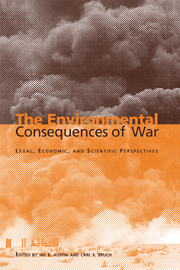Book contents
- Frontmatter
- Contents
- List of illustrations
- List of tables
- List of contributors
- Acknowledgements
- Foreword by Klaus Toepfer
- Introduction
- Part I General principles
- Part II The legal framework
- Introduction
- 2 The law of war and environmental damage
- 3 War and the environment: fault lines in the prescriptive landscape
- 4 The inadequacy of the existing legal approach to environmental protection in wartime
- 5 United States Navy development of operational-environmental doctrine
- 6 In furtherance of environmental guidelines for armed forces during peace and war
- Introduction
- 7 Peacetime environmental law as a basis of state responsibility for environmental damage caused by war
- 8 Environmental damages under the Law of the Sea Convention
- 9 The place of the environment in international tribunals
- 10 Civil liability for war-caused environmental damage: models from United States law
- Part III Assessing the impacts – scientific methods and issues
- Part IV Valuing the impacts – economic methods and issues
- Part V Prospects for the future
- Index
Introduction
Published online by Cambridge University Press: 04 August 2010
- Frontmatter
- Contents
- List of illustrations
- List of tables
- List of contributors
- Acknowledgements
- Foreword by Klaus Toepfer
- Introduction
- Part I General principles
- Part II The legal framework
- Introduction
- 2 The law of war and environmental damage
- 3 War and the environment: fault lines in the prescriptive landscape
- 4 The inadequacy of the existing legal approach to environmental protection in wartime
- 5 United States Navy development of operational-environmental doctrine
- 6 In furtherance of environmental guidelines for armed forces during peace and war
- Introduction
- 7 Peacetime environmental law as a basis of state responsibility for environmental damage caused by war
- 8 Environmental damages under the Law of the Sea Convention
- 9 The place of the environment in international tribunals
- 10 Civil liability for war-caused environmental damage: models from United States law
- Part III Assessing the impacts – scientific methods and issues
- Part IV Valuing the impacts – economic methods and issues
- Part V Prospects for the future
- Index
Summary
Introduction
In view of the heated debate about the status and effectiveness of international law-of-war treaties for protecting the environment during armed conflict, it is prudent also to examine norms, rules, and enforcement mechanisms derived from other legal regimes. The environmental protection systems that have had the luxury of evolving under peacetime conditions generally are more nuanced and tailored to their subject matter than the sporadic attempts to incorporate environmental concerns into the law of war. While they of course do not address the extreme circumstances encountered in full-scale armed conflict, many peacetime environmental treaties and domestic statutes have state-of-the-art provisions for deterring and remedying the same kinds of impacts – for example, catastrophic oil spills or deforestation – commonly found during wartime. Thus, at least where it is possible to consider these impacts in isolation, environmental and other peacetime laws may prove useful for wartime environmental protection, either through their direct application or through analogizing and adapting them into the law-of-war regime.
One large question, alluded to in the previous section, is whether global and international environmental treaties such as the Framework Convention on Climate Change or the Convention on Biological Diversity remain in effect during armed conflict. If it could be shown, for example, that oil well fires had led to excessive emissions of greenhouse gases, that could serve as an additional basis for holding the state that caused the fires responsible and liable.
- Type
- Chapter
- Information
- The Environmental Consequences of WarLegal, Economic, and Scientific Perspectives, pp. 183 - 189Publisher: Cambridge University PressPrint publication year: 2000



